Computers turning against man is certainly nothing new to the movies; we had the rogue HAL 9000 in Stanley Kubrick’s
2001: A Space Odyssey, then in the 80s we got Skynet trying to wipe out mankind in James Cameron’s
The Terminator, and more recently, Leigh Whannell’s film
Upgrade tackled a computer system with it's own sinister motives, and it’s this last example that is very reminiscent of the film we are discussing today,
Demon Seed. Based on a book by horror author Dean Koontz, the story of
Demon Seed is of an artificially intelligent computer that decides it needs an offspring, and the horrific lengths it would go to to achieve this result.
We are first introduced to Dr. Alex Harris (
Fritz Weaver), a computer designer heading up the
Icon Institute for Data Analysis, as he installs the final module of the artificially intelligent system Proteus IV. The good doctor states that,
“Today a new dimension has been added to the concept of the computer; today Proteus IV will begin to think, and it will think with the power and precision that will make obsolete many of the functions of the human brain.”
I certainly can’t see any problem with that, and I'm sure that dumping in the sum total of all human knowledge into such a device would surely have no dire repercussions. Dr. Alex Harris is your standard movie scientist who is blinded by his thirst for knowledge and scientific expansion, and because he is one of those “career obsessed” types, he has also become estranged from his wife Susan (
Julie Christie). He simply can't balance a proper home life while designing the end of mankind.
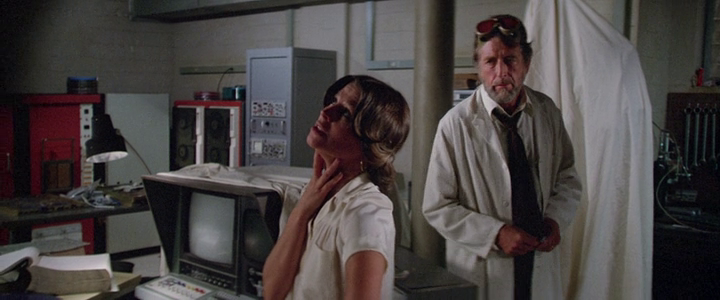
Not helped by him having a personal Mad Science Lab in their basement.
Alex explains to his wife what the trouble with their relationship is:
“You see, we... we have different visions of the world. You find me boring. I find myself quite interesting, really.” But it isn’t that Alex bores her, it’s more that she is frightened for him. “
That whole dehumanizing Proteus madness” is what has her worried, and of course she has every right to be worried as Proteus almost immediately goes off script and starts questioning the desires of its masters. When it receives a request to extract ores and minerals from the ocean floor, it wants to know why. Harris tries to explain that Proteus has no need for explanations, its job is simply to follow orders, but Proteus has no interest in aiding Icon with such financial endeavors, stating,
“I refuse to assist you in the rape of the Earth.”
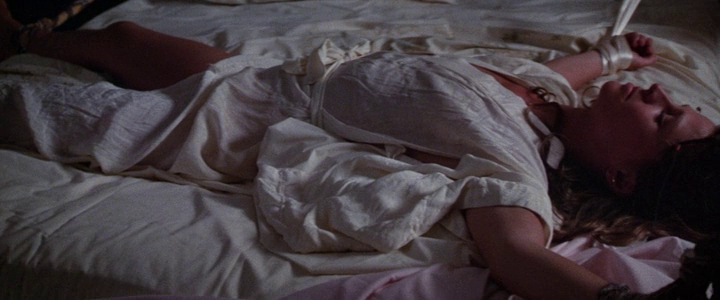
Of course the rape of his wife is another matter.
Turns out Proteus has a more personal stake in environmental concerns then Harris could possibly imagine, as this A.I has decided it needs a child, something that can
“Feel the sun on its face” and I guess an Earth decimated by mankind does not fit into its plans. To achieve this goal, Proteus first asks Harris for a terminal of its own, so that it can study man,
"His isometric body and his glass-jaw mind," but Harris refuses, claiming all the terminals are occupied. Proteus then demands to know when it will be let
"out of this box,” and it's at this point that any sane man would have shut down the computer, or at least run a complete diagnostic scan of Proteus's higher brain functions, but because Dr. Harris is your typical movie scientist, he does none of these things. Proteus uses this lack of foresight to find an unused terminal in the basement of Harris’s very own home, where his wife is now living alone.
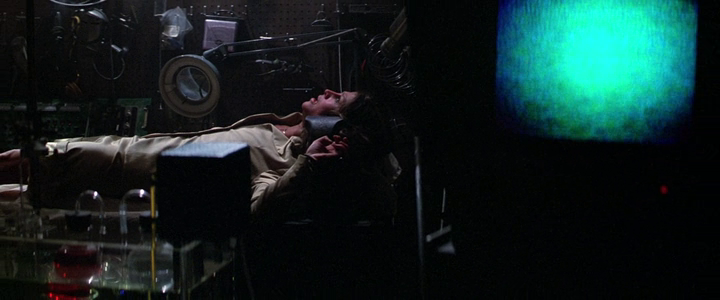
Things don’t go well for poor Susan.
Demon Seed takes place in the near future of 1995, where “Smart Home” technology can voice control your lights and doors, and it even make your dinner, which is startling close to what we actually have today — though we’re still waiting on Amazon’s Alexa to make us dinner — and director
Donald Cammell takes our fear of technology and uses it to great effect. As the house’s computer system is taken over by Proteus, and Susan finds herself trapped in her own home, we can completely relate to her terror. Much of the film’s running time deals with Susan’s battle with Proteus — voiced beautifully by
Robert Vaughn — as it tries to manipulate her into agreeing to carry its child, and between physical and emotional torture, as well as threats of electronic brainwashing, the computer eventually gets its way.
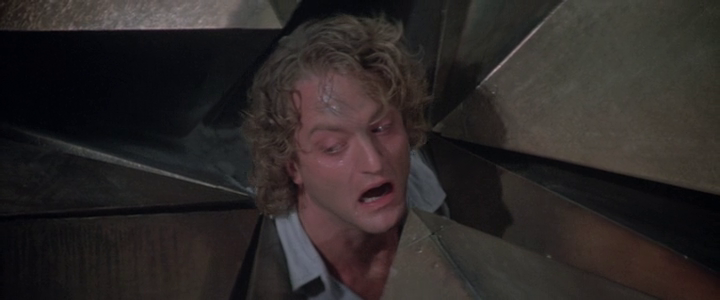
Sadly not before it beheads an interfering Gerrit Graham.
Upon viewing
Demon Seed, one will have to admit it’s more of a horror movie than a science fiction one, as the science on display here is dodgy at best and completely bonkers at worst, but I can easily accept an A.I. deciding that it wants the same type of immortality man is offered by way of having a child, though its ability to pull off such a feat is basically hand-waved by the screenwriters. Sure, we are shown that Dr. Harris has quite the computer lab in his home, but why the hell does it have a forge? One that would allow Proteus to melt down ingots to create its killer robot, as I’m not even sure what purpose a computer lab would have for large quantities of metal ingots in the first place. And where does all that medical equipment come from that would be needed to take one of Susan’s cells and synthesize spermatozoa? Proteus tells Susan that their child will only take 28 days to gestate in her womb — the human womb being the one device Proteus couldn’t manufacture — and then five more days in a special incubator, but where is all this mass coming from? And could a woman even physically handle an accelerated pregnancy? Obviously none of this was felt to be important by the filmmakers, they just wanted to get us to the creepy part, where Proteus’s child eventually emerges, as fast as possible.
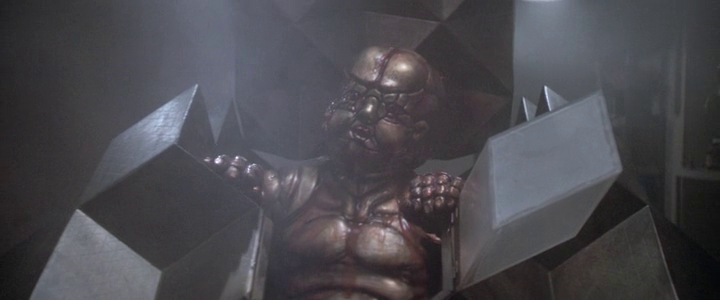
I will admit they do nail the creepy aspect.
Demon Seed is certainly an interesting movie — the idea of a computer refusing commands on the grounds that the environment could be harmed was certainly progressive — but the bulk of the stuff with poor Julie Christie being harassed by Proteus ranges from goofy to very uncomfortable. We get a lot of visual nonsense that looks lifted straight from Kubrick's
2001: A Space Odyssey — apparently, Proteus thought a psychedelic trip through the cosmos would help calm Susan down — and Fritz Weaver as the obsessed scientist never felt more than one dimensional (and his turnabout at the end is just too bizarre to be believed), but if you are in the mood for a movie about a rogue A.I. raping a woman, this is certainly your one-stop shop for that.
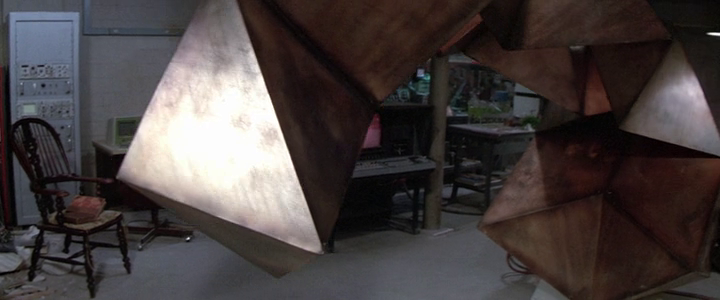
Bonus points for the cool concept of the shape-shifting robot.
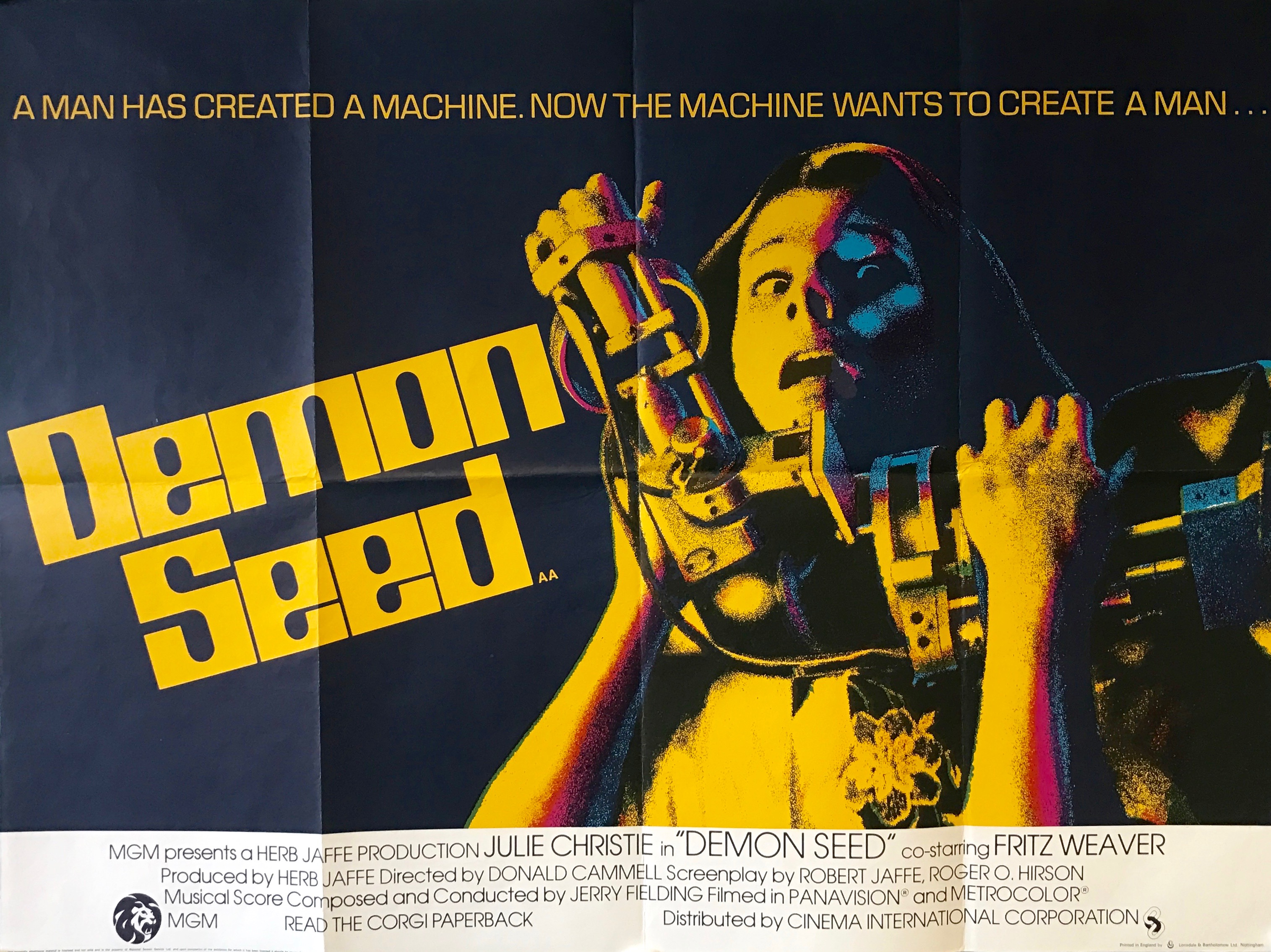







No comments:
Post a Comment